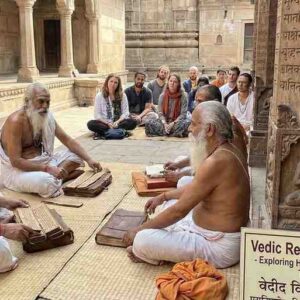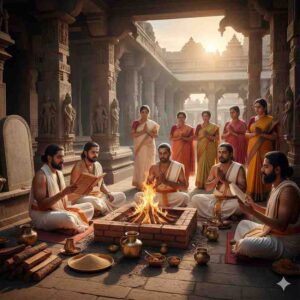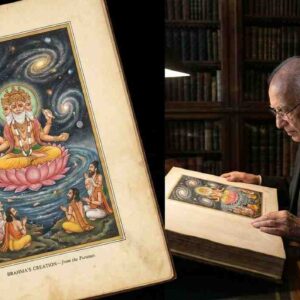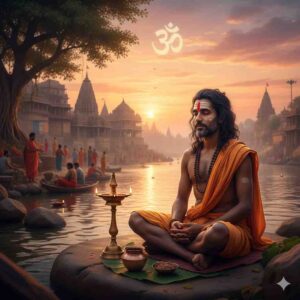TheVedic philosophy, rooted in the ancient texts of theVedas, serves as the cornerstone of Hindu spirituality and religious traditions. Revered asShruti(divinely revealed knowledge), the Vedas are not merely a collection of rituals but a profound exploration of existence, the cosmos, and the self. They provide the philosophical framework that underpins Hindu religious practices, offering deeper meaning to rituals and fostering a holistic understanding of spirituality.
This article delves into how Vedic philosophy illuminates the essence of religious practices, enhancing their significance in the spiritual journey.
What Is Vedic Philosophy?
Vedic philosophy emerges from theRigveda,Yajurveda,Samaveda, andAtharvaveda, which collectively explore:
- Brahman: The ultimate reality or cosmic consciousness.
- Atman: The individual soul or self, seen as a reflection of Brahman.
- Rita: The cosmic order that governs the universe.
- Karma: The principle of action and its consequences.
This philosophy forms the backbone of Hindu religious thought, influencing rituals, ethics, and the pursuit of spiritual enlightenment.
How Vedic Philosophy Shapes Religious Practices
1.The Foundation of Rituals
Vedic philosophy emphasizes the interconnectedness of all existence, and this principle is reflected in religious rituals likeyajnas(fire sacrifices). These rituals are not mere acts of devotion but symbolic gestures to maintainRita, the cosmic balance.
- Purpose of Rituals: Acts like offering oblations to fire (Agni) signify the exchange of energies between humans and the divine, reinforcing the principle of interconnectedness.
- Philosophical Insight: Through rituals, Vedic philosophy teaches the importance of harmony, gratitude, and responsibility toward the cosmos.
2.Meditation and Mantras
Vedic texts introducemantrasas tools for spiritual alignment. Chanting mantras like theGayatri Mantra, derived from the Rigveda, is not only an act of devotion but a meditative practice rooted in Vedic philosophy.
- Significance: Mantras are vibrations that align the self (Atman) with the universe (Brahman).
- Philosophical Insight: They encourage self-awareness and mindfulness, emphasizing that divinity lies within and can be realized through introspection.
3.The Role of Dharma and Karma
The Vedas articulateDharma(righteous duty) andKarma(actions and their results) as central to religious and ethical living. These concepts transcend rituals, guiding individuals to live in alignment with cosmic principles.
- Dharma in Practice: Observing religious duties, like fasting or charity, reflects adherence to one’s Dharma.
- Karma in Rituals: Actions performed during rituals remind practitioners of the law of cause and effect, encouraging conscious and moral decision-making.
4.Symbolism in Religious Acts
Vedic rituals often incorporate symbolic acts that resonate with deeper philosophical meanings.
- Examples:
- Lighting a lamp symbolizes dispelling ignorance with the light of knowledge.
- Offering water signifies purification and the cyclical nature of life.
- Philosophical Insight: These acts transcend physical gestures, urging practitioners to reflect on their inner spiritual journey.
Why Vedic Philosophy Enhances Religious Practices
- Beyond Rituals: Vedic philosophy transforms rituals from mechanical acts into meaningful spiritual engagements.
- Holistic Approach: By linking the physical with the metaphysical, it offers a balanced path to spiritual growth.
- Universal Relevance: Concepts like Dharma, Karma, and interconnectedness resonate beyond cultural and religious boundaries, making Vedic philosophy universally applicable.
Modern Applications of Vedic Philosophy in Religious Practices
- Mindfulness Practices: Meditation techniques derived from Vedic traditions are gaining global popularity as tools for mental and spiritual well-being.
- Sustainability: Vedic teachings on harmony with nature inspire eco-conscious rituals and practices.
- Inclusive Spirituality: The Vedic notion of divinity within all beings fosters inclusivity and compassion in contemporary religious practices.
FAQs
What Is the Connection Between Vedic Philosophy and Hindu Rituals?
Vedic philosophy forms the theoretical foundation for Hindu rituals, emphasizing the cosmic significance of acts like yajnas and mantra chanting.
How Do Vedic Texts Define Dharma?
In Vedic philosophy, Dharma refers to righteous duty aligned with cosmic principles, guiding individuals toward ethical living and spiritual fulfillment.
Why Are Mantras Important in Vedic Rituals?
Mantras are vibrational tools in Vedic rituals that align the individual self with universal consciousness, fostering mindfulness and spiritual harmony.
What Is the Role of Karma in Vedic Practices?
Karma, as articulated in Vedic philosophy, underscores the law of cause and effect, reminding practitioners of the ethical consequences of their actions.
Conclusion: A Unified Path to Spiritual Insight
Vedic philosophy serves as the guiding light for Hindu religious practices, infusing them with deeper meaning and universal relevance. By connecting rituals to profound metaphysical principles, it transforms everyday acts into spiritual milestones. Whether through mantra chanting, Dharma observation, or symbolic offerings, Vedic philosophy ensures that religious practices are not only acts of faith but also journeys of intellectual and spiritual growth.
This timeless synergy between philosophy and practice continues to inspire seekers worldwide, offering a balanced path to self-realization and universal harmony.










